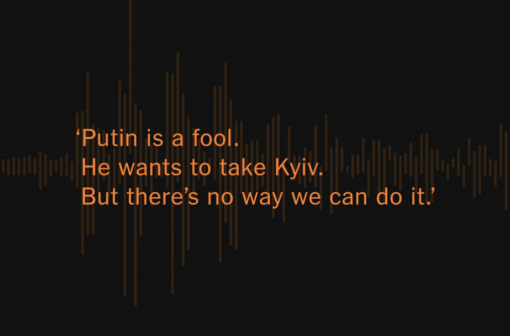I find Kinga Dunin’s conversation with Ukrainian filmmaker and intellectual Oleksiy Radynski refreshing — not because Radynski is a nuanced, scholarly thinker, but because he is a creative, provocative, connective thinker, more Deleuzian in spirit than anything else, which is a missing element from so much thinking on the present Russo-Ukrainian crisis.
Scholars, for instance, will debate whether and how democracy functions in Ukraine (Mikhai Minakov’s and Matthew Rojansky’s 2018 piece was good on that, and here’s one attempt to update that), and whether and how Putinism fits the label of fascism (Cain Burdeau’s recent overview of those arguments is helpful). Radynski simply uses the terms to think with and beyond them.
On democracy, here’s an exchange between Dunin and Radynski:
KD: It’s turned out that the Ukrainian state is quite well organized, efficient, and works surprisingly well despite the war.
OR: This is not the power of the state, but of democracy. February 24 completely changed our vision of what democracy is. It was not the state that organized resistance, but the people who self-organized. Nothing in my life has brought me around more to people’s democracy. I think this is why Russia lost the battle of Kyiv, which one day, with hindsight, may turn out to have been a breakthrough moment in this war. They had a completely vertical and nondemocratic way of managing their military. The commanders of various ranks weren’t allowed to revise their action plans; they were supposed to march ahead, encircle Kyiv, and seize it. Perhaps it’s a weak argument for democracy, but as far as I know the Ukrainian army is fighting democratically, which means it’s in total disarray. It was so especially during the first weeks, when the territorial defense forces were forming and an incredible number of people wanted to join. This story is yet to be written, it was … Makhnovshchyna [referring to Nestor Makhno’s early twentieth century anarchist militia]. A kind of people’s army. There was something Cossack about it.
Radynski describes Russia as fascist in part due to its “blocking” of “the development of culture” (“What they use is some kind of newspeak, a necro-language,” whereas “we,” Ukraine, “are the only country where free speech in Russian exists for the time being”). He replies to Dunin’s question “So Russian culture should not be boycotted?” with the following:
This would be too big a favor to Russian imperial culture. Russian culture deserves a punishment much more severe than a boycott. It deserves a deconstruction. [. . .]
Deconstructing Russian culture means challenging the existing pantheon, now headed by “Tolstoyevski”—Tolstoy, the “good Russian,” and the mad right-winger Dostoevsky. And not by, let’s say, truly radical writers, such as [Nikolai] Leskov. After the deconstruction of this culture, we will also look in a completely different way at Ukrainian literature, for example at such a decolonial revolutionary as Taras Shevchenko.
He also mentions Vladimir Sorokin’s dystopian futurist novel Telluria. Radynski’s future Russia is a “deconstructed” one that has effectively “decolonized” and “disintegrated” into regionalist movements that can no longer constitute the kind of imperial power we see in full force today.
There’s an idealism here that ignores the potential violence of this “disintegration” as well as its impacts on global geopolitics. But it is a kind of “creatively deconstructive” thinking that’s needed to balance out the “realism” of the Mearsheimers, Chomskys (despite the latter’s anarchist ideals), Kissingers, and others who cannot see a future beyond present configurations.
Radynski has shared the following backgrounder on his Facebook page:
e-flux published an interview on the decolonization of Russia that I gave to Kinga Dunin around three months ago. In the meantime, the idea to decolonize Russia kind of skyrocketed. It’s no longer a niche thing: it’s actively debated at international forums, popular magazines and even at panels organised by the State Department. It’s been picked up as a scarecrow by Russian propaganda, which increased its visibility by a multiple.
But we have to be careful with the popularity of this idea in the West. The Russian Federation should be decolonized (read: dismantled) as a result of its own internal contradictions, and not as an outcome of external meddling: this would only lead to a stronger fascist reaction in Russia. What we should do is take advantage of those internal contradictions to help the oppressed peoples liberate themselves.
We in Ukraine are best positioned to take this advantage. Our post-colonial situation allows us to understand the Russian system much better than it understands itself. In addition, we know how to use Russian language and are able of freely doing this, while the total majority of people in Russia are not.
Radynski’s conversation with Dunin can be read on e-Flux Notes.


